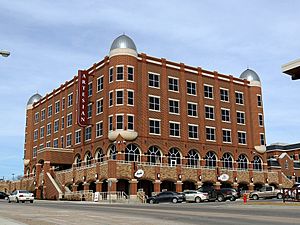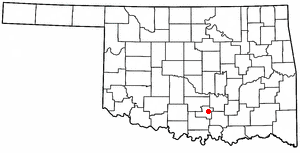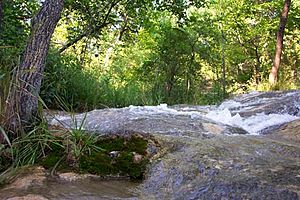Sulphur, Oklahoma facts for kids
Quick facts for kids
Sulphur, Oklahoma
|
|
|---|---|

Chickasaw Nation Artesian Hotel (2014)
|
|
| Nickname(s):
"City of Springs"
|
|

Location of Sulphur, Oklahoma
|
|
| Country | United States |
| State | Oklahoma |
| County | Murray |
| Area | |
| • Total | 7.03 sq mi (18.21 km2) |
| • Land | 6.85 sq mi (17.75 km2) |
| • Water | 0.18 sq mi (0.47 km2) |
| Elevation | 981 ft (299 m) |
| Population
(2020)
|
|
| • Total | 5,065 |
| • Density | 739.20/sq mi (285.41/km2) |
| Time zone | UTC-6 (Central (CST)) |
| • Summer (DST) | UTC-5 (CDT) |
| ZIP code |
73086
|
| Area code(s) | 580 |
| FIPS code | 40-71350 |
| GNIS feature ID | 2411997 |
Sulphur is a city in Murray County, Oklahoma, United States. It is also the county seat, which means it's where the local government offices are. In 2020, about 5,065 people lived there.
The area around Sulphur is famous for its natural mineral springs. These springs were well-known even before the city was founded in the late 1800s. The city got its name because of the sulfur found in the water from these springs.
Contents
History of Sulphur
Early Days and Settlements
Long ago, this area was part of the Chickasaw Nation's land, called Indian Territory. The first known settler was Noah Lael. He built a ranch near Pavilion Springs in 1878. Noah was the son-in-law of Cyrus Harris, who used to be the governor of the Chickasaw Nation.
In 1882, the ranch was sold to Perry Froman, a Chickasaw rancher. Many people believe that his ranch house was the very first home in Sulphur.
Around 1890, some fishermen built a clubhouse at the Sulphur site. Soon, people started holding meetings and gatherings there. The clubhouse became so popular that its owners made it bigger and sold it to be used as a hotel.
Richard A. Sneed, a lawyer, visited the area around 1890. He then started the Sulphur Springs Company. This company bought about 600 acres (2.4 km2) of land from Froman Ranch and planned out a town. A post office named Sulphur opened on October 2, 1895. The first newspaper, Sulphur Headlight, started in 1899, and the first telephone service began in 1900.
Railroad and Park Creation
In 1903, the Sulphur Springs Railway was finished. It connected Sulphur to Scullin, which was about 9 miles (14 km) away. From Scullin, people could connect to the larger St. Louis and San Francisco Railway (also called Frisco). The Frisco railway bought the Sulphur Springs Railway in 1907.
In 1902, the U.S. Government and the Chickasaw Nation decided to protect the area around the springs. They called it the Sulphur Springs Reservation. Later, it was renamed Platt National Park. Because of this, people and buildings had to move out of the park area. The people moved nearby, creating two new communities: West Sulphur and East Sulphur, separated by Rock Creek.
Another move happened in 1904 when the U.S. government added another 200 acres (0.81 km2) to the park. The reservation officially opened to the public on April 29, 1904. In 1976, Platt National Park became part of the much larger Chickasaw National Recreation Area (CNRA), which also includes Lake of the Arbuckles.
Becoming a County Seat
In 1908, Sulphur won an election against Davis, Oklahoma to become the county seat of the newly formed Murray County. This meant Sulphur would be the main town for the county's government.
Recent Tornadoes
On May 9, 2016, a strong tornado hit just northwest of Sulphur. It caused a lot of damage to homes and trees.
More recently, on April 27, 2024, a very powerful tornado hit the city directly. This tornado was part of a larger storm system that affected many parts of Oklahoma. The tornado caused a lot of damage to most of the town. Sadly, one person died in Sulphur because of this storm.
Geography of Sulphur
Sulphur is located in southern Oklahoma. It is about 84 miles (135 km) southeast of Oklahoma City. The city covers a total area of about 7.0 square miles (18.2 km2). Most of this area is land, with a small part being water.
Population and People
| Historical population | |||
|---|---|---|---|
| Census | Pop. | %± | |
| 1900 | 1,198 | — | |
| 1910 | 3,684 | 207.5% | |
| 1920 | 3,607 | −2.1% | |
| 1930 | 4,242 | 17.6% | |
| 1940 | 4,970 | 17.2% | |
| 1950 | 4,389 | −11.7% | |
| 1960 | 4,737 | 7.9% | |
| 1970 | 5,158 | 8.9% | |
| 1980 | 5,516 | 6.9% | |
| 1990 | 4,824 | −12.5% | |
| 2000 | 4,794 | −0.6% | |
| 2010 | 4,929 | 2.8% | |
| 2020 | 5,065 | 2.8% | |
| U.S. Decennial Census | |||
In 2000, there were 4,794 people living in Sulphur. About 79% of the people were White, 13% were Native American, and about 5% were Hispanic or Latino.
The average age of people in Sulphur in 2000 was 39 years old. About 24% of the population was under 18, and 20% was 65 or older.
Economy
For a long time, industries like asphalt, lead, and zinc mining were important in Sulphur. However, today, tourism is the main way the local economy makes money. People visit Sulphur for its natural beauty and attractions.
Attractions and Things to Do
Sulphur has many interesting places to visit:
- Chickasaw National Recreation Area: This park, which used to be Platt National Park, is a very popular place for tourists. It's just south of Sulphur.
- Sulfurous Water Springs: The city is known for its natural sulfur springs. In the past, some people believed these waters could help cure illnesses. The water has a unique smell and taste that some people really enjoy.
- Arbuckle Mountain Range: To the southwest of Sulphur, you can find the beautiful Arbuckle Mountains. They offer many chances for hiking and other outdoor activities.
- Chickasaw Cultural Center: This museum in Sulphur tells the amazing story of the Chickasaw Nation. It's a great place to learn about their history and culture.
- Vendome Well: This is the largest natural artesian spring in Oklahoma. Its sulfur water used to flow into a stream that met Travertine Creek, forming a small lake. People would put the mud from this lake on their bodies, believing it would help with their health.
Education
Public Schools
The city of Sulphur is served by the Sulphur Public School District. The first public school in Sulphur opened in 1904. Today, the district has an elementary school, an intermediate school, a junior high school, and a high school. In 2008, about 1,383 students were enrolled in the district.
Sports are a big part of school life in Sulphur. Football is very popular, and the Sulphur Bulldogs have won State Championships in 2002 and 2004. They were also state runner-up in 2003. Other popular sports include powerlifting, basketball, and baseball. The Bulldogs have won state championships in baseball (1966 and 2004) and powerlifting (2005 and 2006). There's a long-standing and exciting sports rivalry between Sulphur and the nearby town of Davis, OK, which is only 7 miles (11 km) away. This rivalry is known as the Murray County Bedlam.
Oklahoma School for the Deaf
The Oklahoma School for the Deaf is also located in Sulphur. It opened in 1908. This school provides the same great learning opportunities for students who are deaf or hard-of-hearing as other schools offer for hearing students. This includes participating in sports like football, volleyball, and track.
Getting Around Sulphur
Roads and Highways
Several important roads and highways pass through or near Sulphur, making it easy to travel to and from the city:
- Oklahoma State Highway 7
- Oklahoma State Highway 7 Spur
- Chickasaw Turnpike
- U.S. Route 177
Famous People from Sulphur
- Loyd Arms: He won the NCAA Wrestling National Championship in the heavyweight division. He was also drafted by the Chicago Cardinals to play football in 1943.
- Wayne Bennett: A famous blues guitarist, he was born in Sulphur.
- Roy Joseph Turner: He served as the governor of Oklahoma from 1947 to 1951. He was born on November 6, 1894. The Turner Turnpike, a major highway connecting Tulsa and Oklahoma City, is named after him.
Images for kids
See also
 In Spanish: Sulphur (Oklahoma) para niños
In Spanish: Sulphur (Oklahoma) para niños
 | Delilah Pierce |
 | Gordon Parks |
 | Augusta Savage |
 | Charles Ethan Porter |





